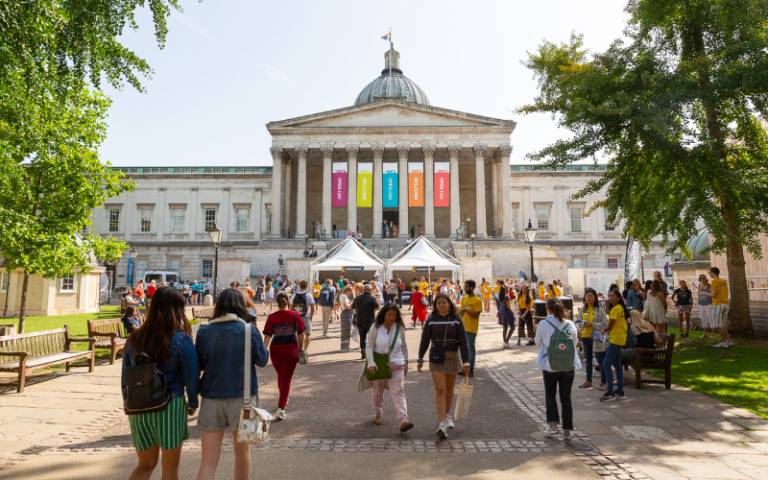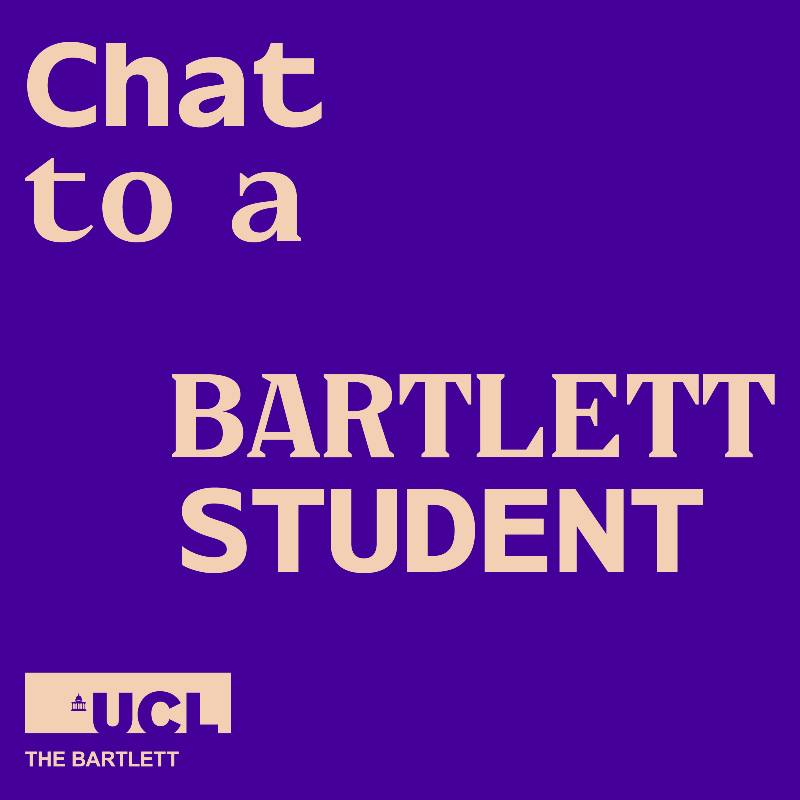5 top tips for applying to an undergraduate degree
Applying to university may seem like a very stressful experience as you navigate what to study, where to study and how the process works. You want to make sure that you’re making the right decisions about your future and getting all your applications in on time and to ensure the highest chance of success. Whether you’re a home or international student applying to The Bartlett, these five top tips will give you the edge on your application - and get you ahead of the game.
For me, as an international student and the first in my family to attend university, applying to university was a daunting experience. Before I even received offers, I was overwhelmed with so many aspects of the application process, including where I wanted to study, what course I wanted to take, and how it worked. Luckily, there is so much support available, both from UCL and online is a variety of formats to extinguish any nerves you may have.
#5: Research the course beforehand (and find what fits for you)
Before you even start your application, it’s important to look into the courses that we offer at The Bartlett to see if they’re right for you. Before I applied to Urban Planning, Design and Management BSc, I ensured that I looked into the prospectus, the modules offered, entry requirements, accreditation and the degree structure to make sure it was right for me. If you have any questions about the course, it’s worth contacting the Admissions Tutor (usually on the prospectus pages) to make sure that any concerns are addressed before you apply. I recommend taking your time to have an in-depth look through what The Bartlett offers in order to find the course that fits who you are as a person and your future aspirations.
Ask yourself: would I enjoy studying this course? Why do I see myself doing after university? Would choosing this degree affect that?
Before I applied to study the Urban Planning, Design and Management BSc, I also took the chance to look online into the opportunities offered at The Bartlett and at UCL. There is a plethora of information available - for instance, I watched a few videos from The Bartlett on YouTube to gain an insight into their courses, had a scroll through their Instagram page to learn about their cross-disciplinary approach towards learning, and viewed The Student Room forums to hear from previous students on their experiences at The Bartlett. Take time to consider everything involved in applying to university in order to make the right decision.
#4: Join an Open Day
If you’re still not sure about applying to The Bartlett, it’s worth joining one of UCL’s Open Days. Their Open Days offer you the opportunity to learn more about UCL, visit the campus and talk to academic staff, current students and admissions tutors. Additionally, you’ll be able to find out about other aspects of your UCL experience, such as student funding, accommodation, and the Students’ Union.
During the current COVID-19 pandemic, all Open Days have been moved online, with The Bartlett continuing to offer taster sessions, Q&As and live discussions to help you make your choice on whether or not to study at UCL.

#3: Nail your personal statement (and stand out from the crowd)
One of the most important parts of your application to study will be your personal application - not only a staple to The Bartlett, but to all universities that you decide to apply to. This is why it is essential to nail down your personal statement, as it gives you a chance to express who you are as an individual (including your skills, future ambitions and work experience) to university admissions staff.
You need to remember that writing a good personal statement takes time - it’s something that you can’t write the night before your application is due! What I did was take it step-by-step - looking at examples of personal statements, creating a plan/outline of what I wanted to write, and also getting a friend or family member to read over my statement to give constructive feedback. While this process might take some time, it’ll be well worth it at the end - and potentially take you one step further to studying at The Bartlett.
In my personal statement, it’s always good to talk about any related subjects to the course that you have previously studied. For my Urban Planning course, while there weren’t any required subjects in the admission requirements, I studied Geography and Environmental Systems and Societies as part of the International Baccalaureate Diploma (IB). In my personal statement, I linked what I learned from these courses during my IB experience and how these could link to the urban environment.
If you want to push your statement further, talk about any extra-curricular or service projects that link to the built environment to showcase your interest in the subject area. During my IB program, I was the Vice-President for a service project that built sustainable, portable schools across Jakarta in order to increase access to education for low-income communities. I was able to use this to connect with how proper urban planning, design and management can solve problems, deal with change, bring communities together, and address the future.
#2: Get your application in on time (or earlier)
Once you’ve prepared your personal statement and other supporting documentation, it’s time to send your application off! For all Undergraduate programmes, you’ll send your application off through UCAS. One thing to keep in mind is that a lot of programmes at The Bartlett are oversubscribed, and prospective students are advised to apply early. Before you start your application, it is recommended to take note of all deadlines, especially if you intend to apply for internal or external scholarships (such as The Bartlett Promise Scholarship).
On the UCAS system, you’ll have the choice to apply to up to 5 universities with no preference order, and the universities you apply to will not see where else you’ve applied until you’ve replied to any offers. I personally applied to 5 universities across the UK related to Urban Planning, with some variation in course content. For example, one course had an emphasis on Environmental Planning and Development, while another course revolved more around Real Estate and Planning.
For some design-based programmes in The Bartlett School of Architecture, a comprehensive design/creative portfolio is required; this is something that is only required after the initial application is made, and you should not send any design work unless it is requested. Nevertheless, it is always a good idea to start preparing your design portfolio beforehand to ensure that it is ready if it is requested. The best thing to do is, firstly, check if a portfolio is required, and secondly, make sure that your portfolio aligns with The Bartlett’s guidelines in order to ensure the best chance for your application.
#1: Choosing The Bartlett
Once you receive your offers, the hardest decision waits: where should you go for university?
I chose The Bartlett for a number of reasons. I appreciated their teaching approach, utilising a cross-disciplinary method that allows students to experience a range of modules, topics and teaching areas that none of the other universities I applied to offered. Their Urban Planning course was innovatively placed, featuring a mixture of planning, design and management aspects. I’ve also already had the chance to work with students from Architecture and Construction Management in one module to explore the built environment in London and create a documentary from it.
Moreover, The Bartlett’s and UCL’s reputation is second-to-none; this year, The Bartlett ranked #2 globally in the 2021 QS World University Subject Rankings for Architecture and the Built Environment, and has remained at #1 in the UK for seven years. This is built upon UCL’s already strong reputation as a university, consistently ranking as a Top 10 university globally and also ranked highly for graduate employability for further career progression.
Finally, I also chose The Bartlett because of the chance to live in London, one of the world’s best cities. It’s further emphasised by how London acts as a live case study for the built environment, with its wide range of architectural styles, continually-transforming landscape, and redevelopment projects. London acts as inspiration to gather ideas for my work to plan better cities, along with its fascinating fusion of culture and endless things to do.

About the author
Hey there! I’m Julian, a final year Urban Planning, Design and Management BSc student at The Bartlett. I originally come from Sri Lanka and the Philippines but consider myself to be a ‘third culture kid’, having lived in Vietnam and Indonesia before moving to the UK for my studies.

 Close
Close


